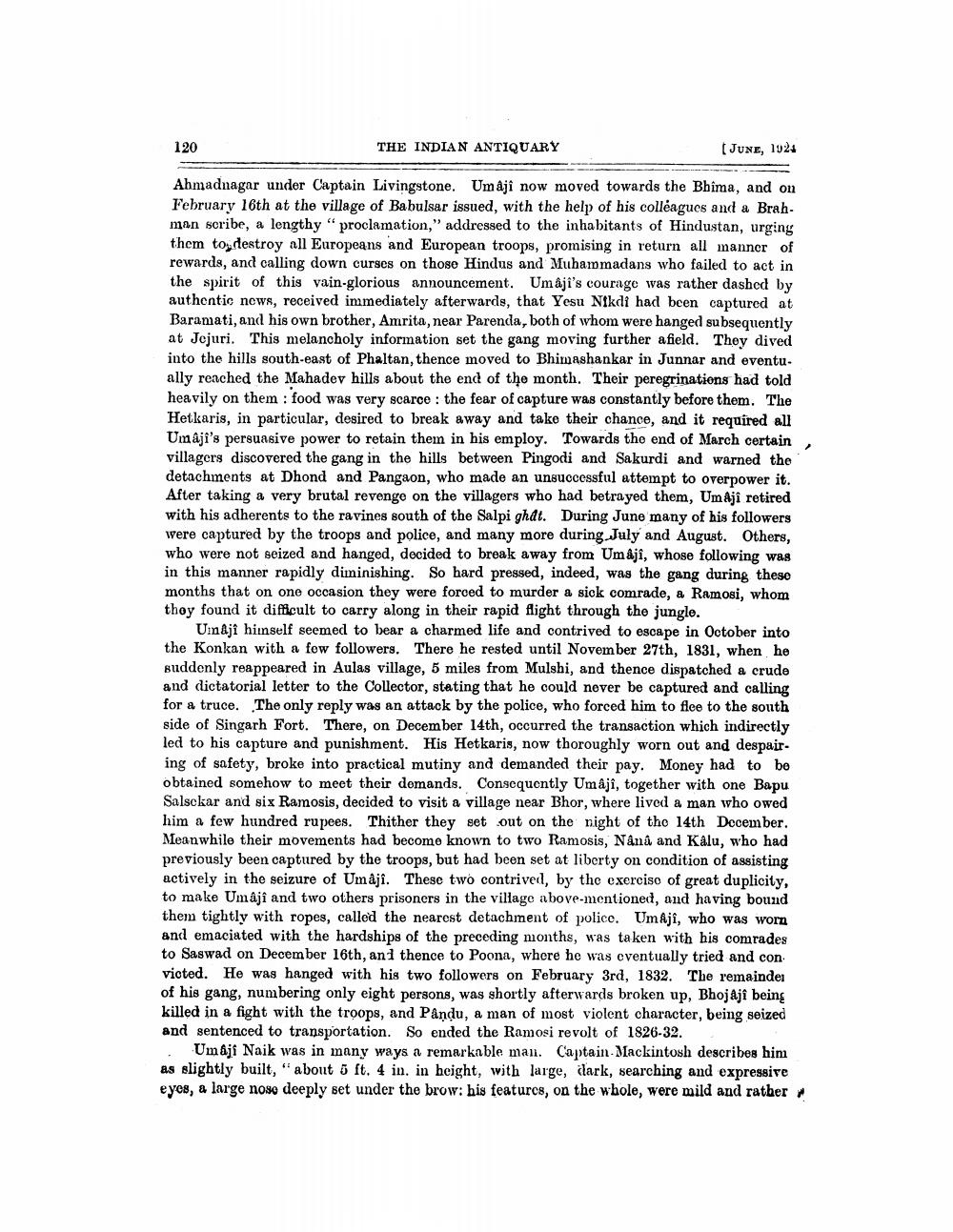________________
120
THE INDIAN ANTIQUARY
JUNE, 1924
,
Ahmadnagar under Captain Livingstone. Umáji now moved towards the Bhima, and on February 16th at the village of Babulsar issued, with the help of his colleagues and a Brah. man scribe, a lengthy" proclamation," addressed to the inhabitants of Hindustan, urging them to destroy all Europeans and European troops, promising in return all manner of rewards, and calling down curses on those Hindus and Muhammadans who failed to act in the spirit of this vain-glorious announcement. Umâji's courage was rather dashed by authentic news, received immediately afterwards, that Yesu Nikdi had been captured at Baramati, and his own brother, Amrita, near Parenda, both of whom were hanged subsequently at Jejuri. This melancholy information set the gang moving further afield. They dived into the hills south-east of Phaltan, thence moved to Bhimashankar in Junnar and eventu. ally reached the Mahadev hills about the end of the month. Their peregrinations had told heavily on them: food was very scarce : the fear of capture was constantly before them. The Hetkaris, in particular, desired to break away and take their chance, and it required all Umaji's persuasive power to retain them in his employ. Towards the end of March certain villagers discovered the gang in the hills between Pingodi and Sakurdi and warned the detachments at Dhond and Pangaon, who made an unsuccessful attempt to overpower it. After taking a very brutal revenge on the villagers who had betrayed them, Um Aji retired with his adherents to the ravines south of the Salpi ghat. During June many of his followers were captured by the troops and police, and many more during July and August. Others, who were not seized and hanged, decided to break away from Umájî, whose following was in this manner rapidly diminishing. So hard pressed, indeed, was the gang during these months that on one occasion they were forced to murder a sick comrade, a Ramosi, whom thoy found it difficult to carry along in their rapid flight through the jungle.
Uinji hiunself seemed to bear a charmed life and contrived to escape in October into the Konkan with a few followers. There he rested until November 27th, 1831, when he Buddenly reappeared in Aulas village, 5 miles from Mulshi, and thence dispatched a crude and dictatorial letter to the Collector, stating that he could never be captured and calling for a truce. The only reply was an attack by the police, who forced him to flee to the south side of Singarh Fort. There, on December 14th, occurred the transaction which indirectly led to his capture and punishment. His Hetkaris, now thoroughly worn out and despair. ing of safety, broke into practical mutiny and demanded their pay. Money had to be obtained somehow to meet their demands. Consequently Umâjî, together with one Bapu Salsckar and six Ramosis, decided to visit a village near Bhor, where lived a man who owed him a few hundred rupees. Thither they set out on the night of the 14th December. Meanwhile their movements had become known to two Ramosis, Nana and Kalu, who had previously been captured by the troops, but had been set at liberty on condition of assisting actively in the seizure of Umáji. These two contrived, by the exerciso of great duplicity, to make Umâjî and two others prisoners in the village above-mentioned, and having bound them tightly with ropes, called the nearest detachment of police. Umáji, who was worn and emaciated with the hardships of the preceding months, was taken with his comrades to Saswad on December 16th, and thence to Poona, where he was eventually tried and con victed. He was hanged with his two followers on February 3rd, 1832. The remainder of his gang, numbering only eight persons, was shortly afterwards broken up, Bhojājí being killed in a fight with the troops, and Pându, a man of most violent character, being seized and sentenced to transportation. So ended the Ramosi revolt of 1826-32. . Umaji Naik was in many ways a remarkable mani. Captain Mackintosh describes him as slightly built, about 5 ft. 4 in, in height, with large, clark, searching and expressive eyes, a large nose deeply set under the brow: his features, on the whole, were mild and rather




